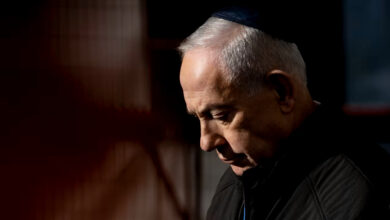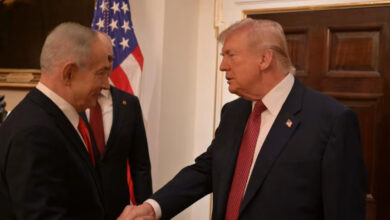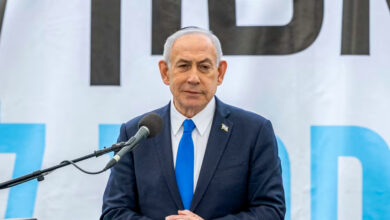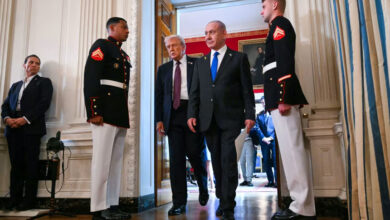All of the major newspapers lead with reports on yesterday’s demonstration in downtown Cairo calling for amendments to Articles 76, 77 and 88 of the Constitution and protesting the continuation of Emergency Law.
Al-Dostour, which runs with the headline “State Security assaults demonstrators with clubs and steel,” describes how security forces cordoned off the street in front of the Omar Makram mosque early in the morning to prevent activists from marching from the mosque toward parliament. One activist was detained and five others injured, and female police were brought in to assault members of the Egyptian Women for Change Association, according to Al-Dostour, which describes the demonstrations as marked with “clashes and violence.”
Al-Shorouq notes that the demonstrations included Muslim Brotherhood members and independent and opposition members of parliament, as well as members of the pro-democracy 6 April and Kefaya movements. The paper also states that in addition to state security violence against the demonstrators, clashes broke out among the demonstrators themselves. As soon as the MPs and participating “symbols of political power” left the demonstration after announcing its end, according to Al-Shorouq, security forces unleashed a “sharp and collective assault” on the remaining protestors. Al-Shorouq also reports on the demonstrating MPs’ refusal to chant against President Hosni Mubarak and his son, while youth activists, especially from the 6 April and Kefaya movements, insisted on chanting against both, and other “symbols of power.”
Al-Wafd focuses on People’s Assembly Speaker Fathi Sorour’s refusal to meet representatives of civil society organizations and accept a petition outlining their demands, which protesting MPs described as a “violation” of prior agreements finalized with the speaker on Sunday 2 May.
Al-Ahram and Rose el-Youssef run lead stories about Mubarak’s meeting in Sharm el-Sheikh yesterday with Israeli Prime Minister Benjamin Netanyahu. Al-Ahram reports that Mubarak expressed his agreement with the “Arab position,” which “refuses any partial solutions” in the peace process, such as a Palestinian state with temporary borders. According to Al-Ahram, Mubarak added that the foundations of lasting peace must be based on a two-state solution and an Israeli retreat to 1967 borders, and that direct Israeli-Palestinian negotiations require a complete halt of settlement construction on Palestinian land occupied in 1967.
Rose el-Youssef runs a story under the headline “Saving the peace process,” noting that the bilateral talks between Mubarak and Netanyahu took place as they awaited the arrival of Palestinian President Mahmoud Abbas. Mubarak initiated indirect peace negotiations following his prior meetings with Arab leaders and the agreement of the Arab peace initiative follow-up committee to resume negotiations with Abbas set to meet US President Barack Obama in Washington, DC in the next few days. Neither Al-Ahram nor Rose el-Youssef report on Netanyahu’s response to Mubarak’s statements.
Al-Ahram editor-in-chief Osama Saraya found in a front-page column more reason than usual to indulge in his characteristic gushing toward the president, as today is the president’s birthday. Describing Mubarak as the “symbol and verse” in “our efforts to build a modern Egypt,” Saraya writes, “Today [Egypt’s] political life is organized, freedom thrives across the nation, and every Egyptian feels free to participate in, and write and say what they feel about, national issues, without fear or hesitation.” Saraya says in his praise of Mubarak that not one citizen suffered as a result of the recent economic downturn, and that Mubarak contributed to ridding the world of terror while keeping his “eye and consciousness” on Egypt’s social and economic development, without compromising “social cohesion.”
Egypt’s newspapers:
Al-Ahram: Daily, state-run, largest distribution in Egypt
Al-Akhbar: Daily, state-run, second to Al-Ahram in institutional size
Al-Gomhorriya: Daily, state-run
Rose el-Youssef: Daily, state-run, close to the National Democratic Party’s Policies Secretariat
Al-Dostour: Daily, privately owned
Al-Shorouq:Daily, privately owned
Al-Wafd: Daily, published by the liberal Wafd Party
Al-Arabi: Weekly, published by the Arab Nasserist party
Youm7: Weekly, privately owned
Sawt el-Umma: Weekly, privately owned




